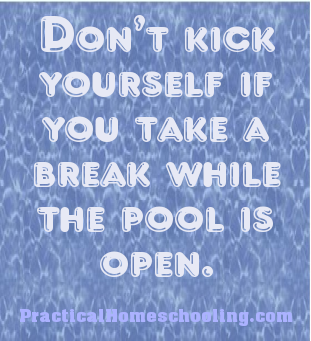 What do you do with those three months between Memorial Day and Labor Day? Even if you're on a year-round schooling schedule, summer just refuses to submit to your parental authority. There is something almost primal about "summer break" that demands that you give in to it. No matter how much you try to be serious, it shouts in your ear, "Enjoy!"
What do you do with those three months between Memorial Day and Labor Day? Even if you're on a year-round schooling schedule, summer just refuses to submit to your parental authority. There is something almost primal about "summer break" that demands that you give in to it. No matter how much you try to be serious, it shouts in your ear, "Enjoy!"
We long ago resigned ourselves to summer's demand to be taken less seriously. We've come to view it as a kind of tonic for the stress built up during the "school year" when it is our duty to feel guilty for not doing enough. "So your 10-year-old is three grades ahead in math - he could be four!" We just notch those stress bands tighter and tighter.
During the summer, though, we've learned to give ourselves permission to give that kind of guilt the heave-ho (and we're working on the rest of the year, too). We follow the admonition of our then four year-old, Joy, who threw up her hands and interjected into the midst of a noisy family debate - "Let's all take a deep breath and think about Jesus!"
Summer is our time as parents to loosen those stress bands so we can take a deep breath and think about what Jesus might say is most important for us as a family. In those three months, we catch a fleeting glimpse of what God really intended the homeschooling life to be like. We focus more on the "home" than the "schooling" in summer, but learning still happens! We just enjoy our children and let our times together as a family unwind us from the year before. Here are some of our "summer better than others" activities compiled over the years.
Walks: Take lots of family walks in the summer. It seems whenever we hit the road or trail, we end up engaged in interesting conversations, or observing nature, or debating some point.
Home Projects: Identify a monthly home project and assign everyone a role in the task - wallpapering, painting, cleaning and organizing the garage.
Reading: Pick several good novels or histories to read on summer evenings. Have a weekly family "book club." Make a regular day for library visits. Listen to books on tape.
Hobbies: Summer is the ideal time to get your children involved in hobbies that will fill up their days. Be sure you create a place where they can keep their hobby materials out and undisturbed.
Challenge Projects: Color outside the lines as a family. Build a family website together. Write and "publish" a book. Build a gazebo in the backyard (for evening reading times).
Activities: Get a game book and try out different indoor and outdoor games. Introduce a new table game each week. Try table tennis (if you have the room), foosball, air hockey or other similar games. Get a basketball goal for the driveway. Take up tennis.
Outings: Plan a weekly field trip to places of fun and interest. Go to the park more. Plan regular day hikes in the country with a picnic. Take up biking. Go fishing.
Events: Plan some fun family events such as scavenger hunts, flashlight tag at night, and stargazing. Invite other families for BBQs, film nights, or a "T-Party" (everything starts with T).
So, what will your children learn during the summer? That life is more than academics. That families are supposed to enjoy one another. That mom and dad can be a lot of fun. That a close, loving, active family is what really counts in life.
But, maybe even more important, what will you learn this summer? That life is too short, and too much stress just makes it shorter. That children enjoy homeschooling more when they see a parent who enjoys homeschooling. That a close, loving, active family is what really counts in life. Enjoy!